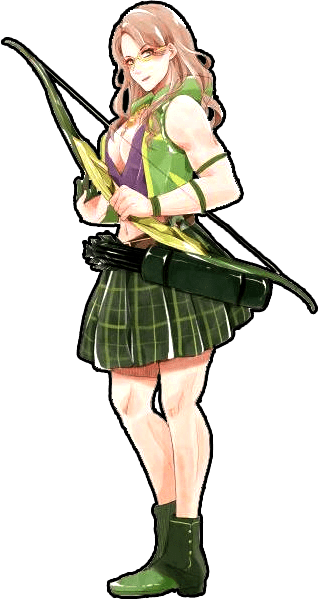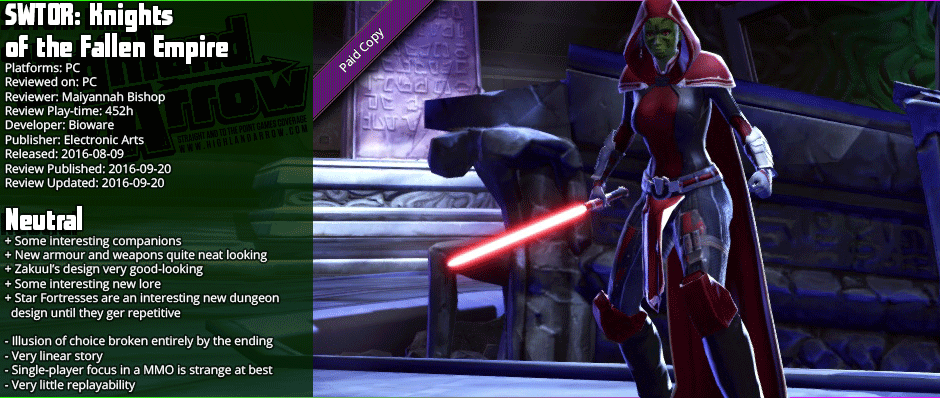

Knights of the Fallen Empire is the latest expansion to the MMO Star Wars: Knights of the Old Republic, developed by Bioware and published by Electronic Arts. It promised a "return to form" of the glory days of Bioware, and while frankly, I'm somewhat skeptical of that claim because I've always felt Bioware was somewhat overrated, I was willing to go along for the ride. Unfortunately, instead of a solid story where mechanics and story went hand in hand to paint me a memorable interactive experience, I got the two separated by an electrified fence and moat, with serious pacing problems, gimmicky gameplay, and bullet spongey enemies abound. Rather than a return to the glory days of old RPGs, we have a questionable narrative focus jammed in with the worst excesses of modern MMORPG design. So, with that damning indictment behind us now, if you were wondering if SWTOR is worth subscribing to again for this content: No, probably not. There's nowhere's near the 24$ worth of content in here and the content that isn't here isn't terribly memorable. Let's get into why I say this.
The premise of KotFE is interesting,
but the expansion fails to deliver on its promise
The core criticism of the story of Knights of the Fallen Empire comes down to this: it offers an interesting world and an interesting premise and then proceeds to do pretty much diddly-squat with it. You're presented a rich lore and quite interesting looking antagonist in Zakuul and its Eternal Fleet, presumably a threat so dire that both the Sith Empire and Republic fold under the weight thereof, and then it just kind of ... sits there, doing nothing, with nothing thus realized for it.
This has a few problems, not the least of which is in the sentence I just wrote there - the idea of a threat so severe that it would essentially subjugate both large galactic powers is a bit ludicrous. Now, the vanilla story campaign and especially Hutt Cartel expansion paint a galaxy where both powers have been severely depleted by their war with one another and actually quite weak, despite appearances. Even if we buy this though, the time frame in which it happens seems ridiculous. The game wants us to believe that Zakuul basically attacked both simultaneously and so decisively that they surrendered and while I may be willing to accept that in terms of space combat with the advent of stuff like hyperspeed FTL drives being standard in the setting, this seems ludicrous for a ground campaign, especially with some of the worlds supposedly having held long-held civil wars and the like. Moreover, as a result of the game not wanting to disrupt the vanilla areas, you never see any real effects of these ground campaigns except for token shield generators for the Star Fortress.
Zakuul itself is almost tragic in this regard. It's an intriguing and quite well visually-designed setting that offers all manner of interesting different story ideas for further expansion that it never really properly expands upon. One example that comes up during the story is the planet's dependence on droid labor for almost all aspects of manufacturing and menial labour - which could offer all manner of interesting social commentary that could speak to our time, but other than one moral choice that ends up meaningless and you never see the effects of, the game does nothing with this beyond the mention. There's all manner of themes in the regard - a utopian society where people seek danger to break the monotony of their daily lives, being another - but none that really get expanded on. Really, it feels like a lot of this was stuff the writers wanted to expand upon, but they ran out of something, be it time, money, cocaine in the cocaine pile, one couldn't say, but with all these thought-provoking ideas and so little done with them, it's easy to see both why there was the hype for Knights of the Fallen Empire while it was in development, and subsequently increasing amounts of disappointment as chapter after chapter that did little with these themes released.
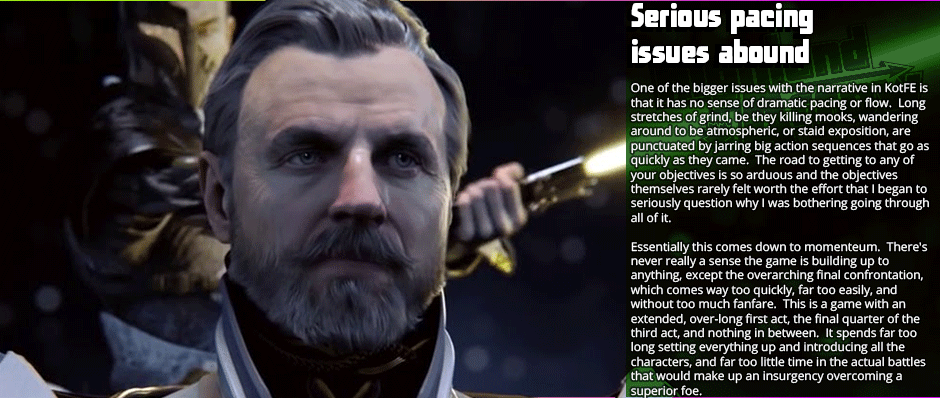
Also lacking is the feeling of any real jeaporady or danger faced by the player. You're never really given a situation where you feel in danger. There's one chapter about midway through where the game takes away your companions and legacy ability to try to up the stakes, and then just throws a bunch of fodder at you and one middlingly-difficult fight - and that's about the apex of the difficulty of KotFE. The game never has any teeth, and none of the companions ever seem placed in a position where there is threat of death, let alone you. This is nonetheless because of the MMORPG nature, but there are plenty of ways to work the illusion of danger into the story without there being actual danger, and KotFE uses none of them.
The companion interactions offer only promise
Companions in general really seem to be something the game focusses on but I'm not really quite sure why it does, because they're unfinished at best. Each one gets introduced through a handful of conversations, and then unless they're one of the less than a handful of driving characters in the plot, mostly get forgotten except when the game remembers their existence. The game almost seems to have most of them there begrudgingly, as if in realization that they promised a grander thing than they could ultimately deliver, and had to create at least some sort of appearance this epic story was at least there.
Let's touch on the thing that the fans go mental on in Bioware, which is to say the romances. Yep, you can romance a few of your companions that come up in KotFE. Now, I never got a chance to play through the Shadow of Revan expansion because it basically requires a group and I found even less people willing to play that than I did Galactic Starfighter, so perhaps there's some long-time arc I'm unaware of, but pretty much all of those companions have the same Mass Effect slash Dragon Age thing, which for brevity's sake I think I'm just going to call the Bioware thing now, where you really don't have to do much to get those people to want to jump your bones, regardless of side, creed, or whether you did the Big Bad Things TM that really piss them off. As long as you say all the flirty things when the game gives you the chance to, you can start a romance with pretty much everyone. It's one of the many ways in which the game undermines any feeling of gravitas to your choices, but we'll circle back to that in a slight bit.
I think the big problem is that it pulls me out of the game, the way this is presented. It feels like completing a quest and receiving a quest reward, rather than making any sort of intimate relationship with everyone. You complete the conversation "quest" and you get some nice kissy kissy and maybe if you're very lucky, some fade to black. And sure, this is what a lot of relationships in many of the games amount to if you reduce it to the component parts, but rather than being nicely polished and having empathetic characters that cause you to miss those bare mechanics, KotFE continues a tradition of telling and not showing in the narrative of SWTOR and instead of showing you going through the process of building any sort of rapport with any of these characters, you're just told you do and then you get your increasingly-PG13 romance scene. It's toothless and token and feels like it is only there for fan service, and that's feeling is ultimately why I don't like it. There've been games that have downright sex scenes that I don't mind it, because it feels like it fits in the scene. It doesn't feel like that here in KotFE, and gets kind of roughly shoved in.
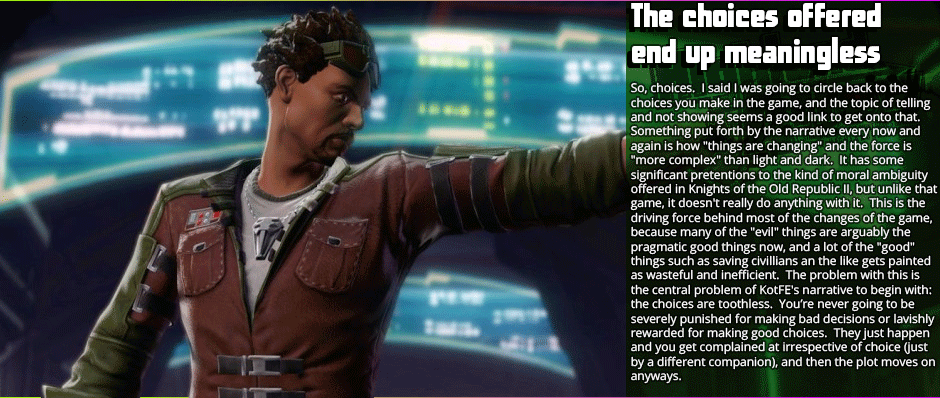
Time and time again everything happens off-screen. The whole story is basically communicated "tell-don't-show" style, presumably because there's no believable way they could present it otherwise. You're told entire armies of jedi and sith alike were slaughtered by the robots and Zakuul Knights you're killing by the dozens before you even truly know what they are. This is a common problem with MMOs, but it's especially present in KotFE: the threat of the armies of the antagonist rings hollow when you have to commit an act of genocide just to get from point A to point B in the map. So if they did truly kill all these people and subjugate both the Republic and the Sith Empire, their forces must have been the most incompetent military force to ever exist. The game even lets you call out that fact, as if acknowledging it makes it any better, just so it can limp out the weak hand-wave of "this is different in some non-specific way we're not going to tell you and is never illustrated."
This becomes particularly pertinent because some of the decisions the game wants to weigh most heavily on you are those ones with body counts attached, but you never really have to deal with the macabre results of those grisly if pragmatic decisions. Plunge an entire society into anarchy for a few days and the most you have is a companion upset with you. Which itself falls on its face, because the companions aren't really fleshed out enough to evoke much empathy, as I mentioned, and part of the reason they don't, is they're usually either on your case, or fighting with each other. There is no reprieve, and before long, I felt like a mother constantly having to sort out squabbling children, not the commander of the grand alliance against the Eternal Throne. I felt like a bureaucrat, not a warrior.
There's a particularly cringe-worthy mechanic where midway through the story your forge a second (or first, third, fourth, fifth) lightsaber and it gives you different abilities based on your decisions, but I don't know anyone who actually used the thing, because doing so was giving you a weapon far below what you probably have from end-game content if you've done any of it at all. Not to mention if you have a lightsaber from the Cartel Market - the game's online store - and good mods in it. My own lightsaber meant that this new one was a significant downgrade in every way. And since you can't put weapon tunings on that new one you lose out on cosmetics as well. So maybe there's some grand mechanic I missed out on, but I wasn't interested in making the bullet sponges even more bullet spongey to find out. They were irritating enough as is.
I'm put in mind of the little token emails KotFE rains on you the whole way - they serve no purpose, save to maybe give you token rewards. Given the relatively low value of the things you get as rewards for the KotFE chapter completion, they're pretty analogous. I come back to this again and again - why am I still playing this? The answer is ultimately because its not bad, and it fills the time, but if I had more enjoyable things to review, I'd be doing those, or if my wife was around for Legion at time of writing, I'd definitely been playing that. It's merely mediocre, but it's kind of the worst kind of mediocre - the mediocre that keeps sucking you in just to stymy you with issue after issue that puts you off. I could only stomach it a chapter or two at a time depending on length, and when I start thinking to myself I could be doing other things like folding the laundry or vacuuming my room, the game has without a doubt failed in it's primary purpose of entertaining me.
Several of the baddies' abilities take me out of the story
There's a term that's popular with the more pretentious critics and that's "ludonarrative dissonance." It's used to refer to instances in a game where gameplay mechanics are at odds with the narrative of the game, and while it's not a term I like to wheel out because I have no problem with a game that focuses just on mechanics or just on story, KotFE is an expansion that's trying to have it's cake and eat it too - boasting great gameplay improvements and an epic story. We've gone over the story prior, but the gameplay ... well, it fares better than the story for the most part, save for an over-reliance on gimmicks - but it also has a bad problem of being at odds with the narrative and world in really quite obvious and thus jarring ways.
I mentioned the way that most enemies are huge bullet sponges and while this is somewhat endemic to MMORPGs, its particularly egregious here. You're supposed to be some badass bounty hunter, sith lord, or jedi, and yet even the enemies that are basically fodder can take several hits with powerful special abilities to down. One would thing with the single-player focus they could scale this down realistically and make it less of a thing, but nope. I'm not the first person to observe this, but it's almost like a game that asks a subscription fee is deliberately padding out its run time. It's really obvious too, since they never hurt enough to really threaten you. It's just padding, and it gets tiring.
The game has a really bad habit of making artificial challenge, either by making companions act in entirely stupid fashions, by crippling your own abilities, or otherwise in general just not following it's own rules. What's that, you play a highly-mobile class that won't stand around for the boss to land it's big fuck you attack on? Well, I hope you enjoy being glued to the ground the moment it winds up its attack, completely robbing you of that ability to evade. There's no skill to these fights, because the abilities that take skill to use get denied you. They're immune to everything but pure damage, you can't stun them, you can't knock them, you can't execute clever tactics on them, you can just cycle your damage combo and hope for the best. It's stupid, it's boring, and it's crap boss design. Even World of Warcraft or EverQuest make attempts to have some sort of unique mechanic to the boss to keep the fight interesting. KotFE doesn't even give you that kind of gimmick. Just pound away until you need to buy new keycaps for you keyboard, if you're lucky. Maybe a new keyboard, if you're not.
There's so many little instances that lack of player power comes across too. For instance, enemies that leap on top of you and claw at your face comes to mind. You know what happens when you leap at someone with a lightsaber? Yeah, I bet you do and I don't even have to tell you. But no, you just kind of sit there, helpless and moaning, while you take the damage. There's so many instances like that, both mechanically or story wise, where really the only thing that stops you from just winning whether it be just a small fight or the larger war, come down to you just being forced to go along with things. That lack of choice. So much of this game would just be resolved if you weren't essentially playing a huge pansy. It's the only way the game knows to threaten you. There's no time the game lets you go off its rails and even punishes you with a bitchslap fuck you sort of enemy, as Avernum so often did. No, KotFE's difficulty curve is a plateau. There can be no challenge, and you never feel challenged or like you're really being some epic fighter. After all, a powerful warrior needs equally powerful adversaries to face up to, to prove their worth.
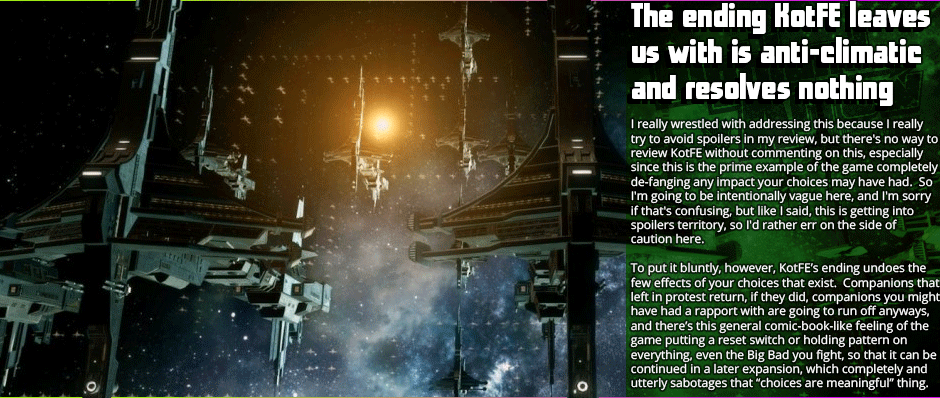
The core problem here is one that I touched on earlier - the game offers you not just the illusion of meaningful choice, but it doesn't even present a compelling illusion thereof, and the ending just breaks that illusion entirely. By revoking the consequences of your actions in this sort of a pursuit of a "reset" as I mention, the game effectively makes all the choices that affected the affected companions affection/influence/whatever meaningless - they get thrown in a hole anyways, disappearing (along with any items you gave them, by the way) until the next time that SWTOR wants to make a few bucks I'd wager. Rather than any feeling of closure or resolution the game only leaves you mid conflict resolution with probably the lamest cliffhanger ending I've seen in a game to date. You never unseat Arcan, someone else does, he gets thrown on a bus, so do the other characters involved, so for the most part, you aren't even left with some neat companions to take with you into the base-line vanilla content, or into one of the two other expansions if you so desired (Hutt Cartel or Shadows of Revan).
The final battle is the worst case of it, but the game has problems with boss design all around - when they aren't just bullet sponges - ridiculous bullet sponges taking 5-10 minutes to beat, incidentally - they're bullet sponges which require a gimmick, either to beat, or to weather certain special attacks. KotFE certainly loved making bosses invulnerable periodically while they summoned waves of mooks for you to defeat, which is to say weak enemies that present no challenge and are just there to pad out the encounter time, and it got tiresome real quick. The expansion seems to do this almost once a chapter, only missing a couple, and in some cases, more than once a chapter. It's bland, uninspired, and serves only to lengthen the run-time, and the expansion was already feeling padded prior to the introduction of these bosses.
Nail in the coffin for me with KotFE was its strange, rigid insistence on the story being single-player only. If you're in a group with another player for any of the story sections and they go into an instance that's a story instance, all you can do is watch. You can't even participate. This happening in a MMO is so bizarre for me I just can't imagine why they would do this, unless perhaps it was the only way they were to get to write a single-player story again or something. As stands, it means I can't even play through it with my wife, which is a lot of what makes the grindier aspects of MMOs like World of Warcraft bearable to me personally. So you are cut off from group play trying to do this, except for the end game mechanic: Star Fortresses.
Star Fortresses are a solid but repetitive endgame mechanic
The one take-away you do get from the expansion upon completion thereof is the end game mechanic of the Star Fortresses. These are basically equivalent to dungeons - or Flashpoints in the SWTOR vernacular (but basically dungeons), that come in basically solo and group variations. You have to unlock them by doing a boring gathering class for a NPC planet-side, to take down the shield generator that protects the Star Fortress, then once you have, you are free to assault them in groups or by yourself.
While the unlocking mechanic is mostly a time-wasting affair reminiscent of attunement from vanilla World of Warcraft albeit not usually that bad (with a couple notable exceptions), but the Star Fortresses themselves I found interesting end game mechanics. They were large, varied up the mechanics between fights (something I wish the story campaign did much more than it does, but we'll come back to that), and the environments were neat-looking and had plenty of little lore goodies if you went exploring, some purely fluff, others offering mechanical advantages that make the Star Fortress easier.
Each Star Fortress is broken up into floors, each with a couple of 'bosses' - though only the end boss at the bottom floor is strictly mandatory, and you can avoid confrontation with the others if you prefer. Each level additionally offers two or three routes through them, which puts the level design well above most MMO dungeons and equivalent content. With the bosses presenting enough of a challenge to engage players but not so much as to be patently unfair, they serve as an interesting counter-example to the copy-paste design of the other bosses in the mainline story, and made me wonder why the game developers couldn't take a note from this design.
That's not to say the Star Fortresses don't get repetitive either, they certainly did as they became the holding pattern between episode releases especially, but I have to give credit where credit's due and if I still had a subscription to SWTOR (I don't), I'd probably be replaying them occasionally, because they're a solid chunk of content that is well-designed and just the right length so as to not overstay it's welcome.
Class balance exists only
because the classes are carbon copies
So having now whinged myself inside out about the content mission and story-wise, I suppose it's time to get into the mechanics. I won't go into too much length here, because that would be the purview of a review of the base game proper, but this is a much better side of the game for the most part, and the big mechanical change that came with KotFE, much like Legion, was a class balance change.. The game boasts eight classes, four for the Republic side, and four for the Sith Empire sire. For the Republic you have the Jedi Knight, Jedi Consular, Soldier, and Smuggler, and for the Sith Empire, you have the Sith Warrior, the Sith Inquisitor, the Bounty Hunter, and the Agent.
The first reason I would say they're uninspired is that there really is just four classes, with a Republic and Sith flavour to both. The Jedi Knight and Sith Warrior are carbon copies, just with mad-libbed abilities with different visual effects - the mechanical effects are the same. Same with the Agent and the Smuggler. Consular and Inquisitor are the big variance, but mostly because one (Inquisitor) got buffed over the years, while the Consular did not. The game really has it in for the healing-based specs of Soldier, Smuggler, and Consular, but not the healing abilities of the other side, so there's the disparity there, and it's a fairly strong one. Consular is the weakest class in the game for this, but the other classes make up for it with not being healing-centric. Soldier and Smuggler are both plenty playable if you avoid the healing-centric specializations.
For those wondering about that specialization mechanic because you're not familiar with MMOs, each of the four classes break down into two sub-classes with three specializations each. In SWTOR's case this is mostly complexity for the sake of it, because you get about three special abilities and that's about it, and they're going to be in line with the sub-class' type either way. The sub-class itself is basically deciding your weapon load-out, for instance the difference for Jedi Knight is between a single-handed lightsaber and a focus, and two single-handed lightsabers. In general the specs are a moot point, because there is one or maybe two basically objectively "best" specs, and everything else may as well be filler, because that's functionally what they are. You can tell pointed difference between the good specs and the bad ones, that's for sure, which some could argue is a lack of balance but really I'd call it just a game design where specs are a second thought and probably only there because World of Warcraft did it.
Other than the one case I mentioned and the specs issue, most of the classes are pretty balanced, although I have pet peeves with all of them. In general it shows the game is skewed towards the melee/force-using classes, because the range of the blaster pistols and rifles would embarrass civil-war-era front-loaders, and the game has only been reducing that range. There's further gripes with the NPC mechanics in this regard, but I'll touch on them later. So while it achieves that balance in the laziest way possible - making the classes pretty much carbon copies. But a soldier on a good spec will be able to stand against a sith warrior in a good spec and vice versa, and the same is true of any of the combinations as long as you're on the strong spec for the class.
Accessibility Notes
- Game runs at full-screen or windowed borderless, but windowed borderless has cursor capture options.
- Keybindings are on a per-character basis and trying to set universal redefines is a bit of a pain.
- The UI is fairly customizable with an Interface Editor to allow you to move UI elements across the screen and enable, disable, and scale them as desired. The microtransaction store UI elements cannot be disabled.
- Over-reliance on certain colour schemes (especially the orange of Nar Shaddaa and parts of Zakuul) with no colour-correction options mean this game is going to be a pain for colour-deficient or colour-blind players.
- Mouse & keyboard inputs only - doesn't work at all with a gamepad.
- Game audio mixing is fairly poor and often dialogue lines can get lost in other sound effects. Subtitles are included, and recommended.
- Visual design has the usual Bioware problem of being very over-saturated with visual effects, making combat often difficult to follow and obscuring what's going on.
- Game's network connection is not particularly tolerant of a degraded connection - expect frequent disconnects if your connection is slow, weak, or has packet loss.


